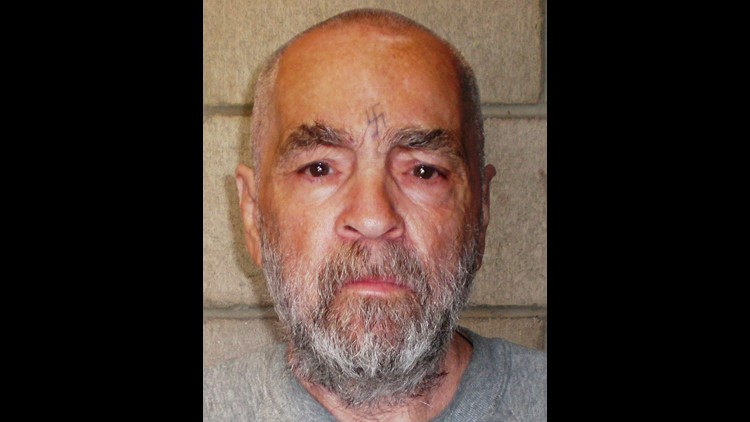Charles Manson, wild-eyed leader of a cult "family" who killed seven people in a bloody rampage in Los Angeles that shocked the nation in 1969, died of natural causes Sunday, according to the California Department of Corrections and Rehabilitation.
Manson, 83, had struggled with gastrointestinal problems and been shuttled back and forth to hospitals in recent years. He had been serving multiple life sentences at California's Corcoran State Prison.
The ghastly "Tate-LaBianca killings" — a murderous blend of 60s sex, drugs and rock 'n' roll — were carried out over two nights in upscale Los Angeles neighborhoods.
Vincent Bugliosi, who prosecuted the Manson case and later wrote a bestselling book, Helter Skelter, about the killings, said in 2009 that the "very name 'Manson' has become a metaphor for evil," The Los Angeles Times reported.
"He has come to represent the dark and malignant side of humanity, and for whatever reason, there is a side of human nature that is fascinated by pure, unalloyed evil," he said.
Among the victims butchered on Manson's orders on the first night of carnage, Aug. 8, 1969, were actress Sharon Tate, 26, the pregnant wife of movie director Roman Polanski, coffee heiress Abigail Folger, 25, celebrity hair stylist Jay Sebring, 35, writer Wojciech Frykowski, 32, and Steven Parent, a teenager visiting the house in Benedict Canyon, above Sunset Blvd.
The Manson "family" killers, including protege Charles "Tex" Watson, Susan Atkins and Patricia Krenwinkel, shot their victims and stabbed them more than 100 times. Before leaving, they wrote the word "pig" in blood on the front door.
Manson, in comments to his followers, dubbed the rampage "Helter Skelter," after the Beatles song of the same name, and said he wanted the murders to start to a race war by leaving clues pointing to black killers.
The house previously belonged to Terry Melcher, a TV and record producer who once declined to sign Manson, an aspiring musician-songwriter, to a contract. Although Melcher no longer lived at the house in late summer 1969, Manson sent his cult followers to the location to kill anyone there.
On the second night, two other "family" members, Leslie Van Houten and Steve "Clem" Grogan, accompanied the original band of killers to the Los Feliz neighborhood in L.A. There they stabbed to death Leno LaBianca, a wealthy supermarket executive, and his wife, Rosemary.
Manson, then 34, had been unhappy with the "messy" operation at the Tate house and gave precise instructions for the second killings, instructing his followers to bind the couple with lamp cords and cover their heads with pillowcases before stabbing them repeatedly
Manson and the five members of his “family” were convicted in 1971 of first-degree murder and conspiracy to commit murder. They were all sentenced to death. The verdicts were commuted to life when the death penalty was briefly outlawed the following year.
Another member of the cult, Linda Kasabian, had driven the killers to the LaBianca house because she was the only person with a valid driver's license, according to The Los Angeles Times. She received immunity for testifying against the group.
Bugliosi, the prosecutor, said the Manson "family" — which operated out of an abandoned ranch in the Mojave Desert— was likely responsible for as many as 35 killings in and around Los Angeles.
In the trial, Bugliosi denounced Manson as the “dictatorial maharajah of a tribe of bootlicking slaves.”
During the seven-month trial, Manson continued to hold sway over his cult members, both in the courtroom and outside the building. Some of the young defendants giggled and sang during the proceedings. At one point, Manson arrived in court with an "x" carved in his forehead. His "family" followed suit the next day.
In testimony at his trial, Manson denied the charges and described himself as a chameleon-like character: "Charlie never projects himself ... People see in Charlie their own reflection ... Linda Kasabian testified against me because she saw me as the father she never liked ... I do what love tells me."
Jeff Guinn, author of The Life and Times of Charles Manson said his two-year research into Manson's background, including interviews with his relatives, debunks any notion of Manson as mystical or magical figure.
"He's a gifted psychopath who's a talented liar who's lied about just about everything," he told USA TODAY in 2013.
"I recognize Manson as an intelligent man," Guinn said. "He's uneducated but he's not stupid, but from his childhood he's been a violent con artist; that has never changed. But I do not consider him in any way insane. Which makes what he did even more horrifying."
In prison, Manson was denied parole 12 times. At one hearing, the parole board commissioner said Manson, who turned the mark on his forehead into a swastika, had amassed more than 100 serious disciplinary violations, including threatening a police officer, possession of weapons and possession of a cellphone.
In 2014, Manson obtained a marriage license to wed Afton Elaine Burton, a 26-year-old fan. But the license later expired without the pair marrying.
Manson, then named Charles Milles Maddox, was born in Cincinnati in 1934 to a single, 16-year-old girl involved in petty crime and prostitution, according to Biography.
In a lengthy interview with Tom Snyder more than 35 years ago, Manson recounted spending most of his early years in jail and reform schools.
"I never thought I was normal, never tried to be normal," he said. At the schools, he said he had to "lay down and get my ass whipped until I couldn't walk."
Manson recalled a dysfunctional childhood in which his mother once hit a man with a bottle, then grabbed her son and fled for Indiana. A drifter in and out of jail and reform school for crimes such as theft and check forgery, Manson eventually made his way to the West Coast where he served 10 years in Washington state prison for pimping and passing stolen checks.
After his release, he drifted south to California, attracting scores of followers, mostly dropouts and misfits on the streets of San Francisco. He eventually settled down with a hard-core group of followers, mostly young girls, at a deserted ranch in the San Fernando Valley where he held court with a mix of drugs, group sex and homegrown prophecies, portraying himself as Jesus Christ.
Over the years, Manson fathered at least two sons, including Charles Milles Manson, Jr., who killed himself with a shotgun on a desolate road in Colorado in 1993, CNN reported. The younger Manson son, Jason Freeman, who changed his name to avoid the "family curse" of being named Manson, said he believed his brother "couldn't live down who his father was."



